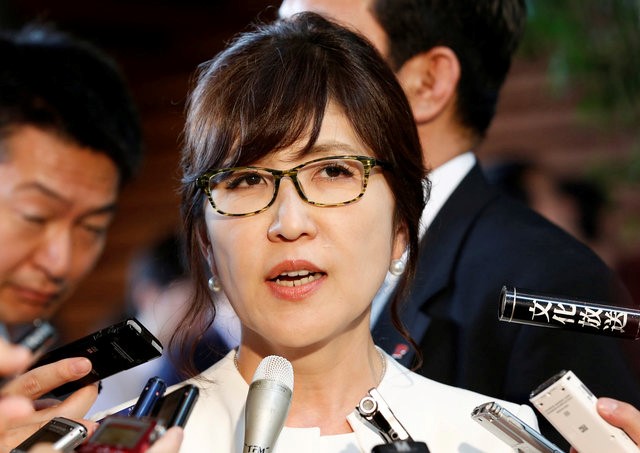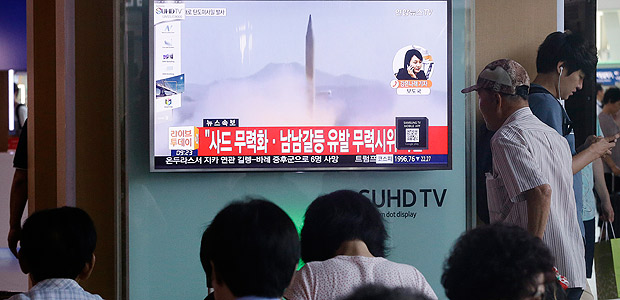Japan's Chinese dilemma
Jonathan Eyal
11 hours ago
While Japan is clearly determined to stand up to China, the Japanese appear uncertain in managing their strategic competition with the Chinese, lacking both a coherent plan and national consensus.
LONDON • Fresh from his fourth straight national election victory, Japanese Prime Minister Shinzo Abe now enjoys the most solid political backing of any leader in his country's post-war history; his party dominates both Houses of Parliament, opposition parties are in complete disarray, and no other politician enjoys a higher personal approval rating than him.
So it was predictable that, with the electoral hurdles safely behind him, Mr Abe should turn his attention to the one topic which, after the economy, he cares most about: that of fixing Japan's military and amending its security posture.
In quick order, Tokyo issued a new defence White Paper which identifies the "growing assertiveness" of China as Japan's most serious challenge. Mr Abe also appointed a hard-line lawmaker famous for her revisionist views of Japan's wartime actions as his new defence minister. And if this was not enough, he reiterated his determination to use the crushing parliamentary majority he now enjoys to remove from Japan's Constitution provisions which restrict his ability to deploy or use military force.
China's response was equally predictable: Beijing expressed "strong dissatisfaction" with and "resolute opposition" to Japan's defence White Paper, and slammed its new defence minister for "recklessly misrepresenting history".
But much of this reaction is exaggerated, for the reality remains that, while Japan is clearly determined to stand up to China, the Japanese are still fumbling into a strategic competition with the Chinese which they seem to scarcely comprehend, and on which Mr Abe still does not enjoy the necessary political consensus inside Japan.
The scale of Japan's rearmament ambitions is no longer in doubt. The country is already America's biggest and closest technological partner on missile defence. Japanese pilots will begin flying the new F-35 stealth jets by the end of this year, the first in an estimated batch of 42 which will give Japan a long sought-after ground attack capability. Meanwhile, the Japanese are already operating the 19,500-ton Izumo, a ship they coyly classify for political reasons as a "destroyer" despite the fact that it has a 250m-long flight deck which makes it look suspiciously like an aircraft carrier. Also, the Japanese navy will be commissioning an identical ship by March next year.
In sheer numbers, however, Japan's military remains puny in comparison to that of its potential rival; it has only 243,000 soldiers, a tenth of China's. Japan also has less than a third of the Chinese air force's inventory. At every level, therefore, the Japanese seek to compensate for quantity with quality. And, for the moment, they have succeeded. For, despite all their sabre-rattling over the disputed Senkaku/Diaoyu islands, military planners in Beijing know that the Chinese navy is still no match for that of Japan.
Still, as Soviet dictator Joseph Stalin once memorably put it: "Although quality is always preferable to quantity, quantity has a quality all of its own." Even if Japan's technological lead is sustained, the sheer size of the Chinese military means that, sooner rather than later, Japan will be relegated to a marginal and subsidiary position in Asia, always inferior to that of China.
TOKYO IN DENIAL?
Adapting to this inferior position will ultimately require a huge psychological change in Japan's thinking and actions, and there is no indication that the process of adaptation is even contemplated in Tokyo. For largely understandable diplomatic reasons, the latest Japanese defence White Paper says virtually nothing on the topic. But even in private, Japanese leaders and strategic thinkers prefer to find every excuse to avoid answering this bigger question.
Some military planners just wish to concentrate on what they believe is an imminent threat of a Chinese seizure of some Japanese-owned disputed islands, something which could inflict a catastrophic psychological blow on Japan, and could even discredit the Japanese-US military alliance. Meanwhile, Japanese politicians expect the rest of the world to come up with a grand strategy to contain China. And too many people in Tokyo seem to hold on to the dream that Japan would ultimately be saved by the eruption of troubles inside China which will prevent that giant from throwing its weight around the region.
Japan is hardly the only country gasping - and often in vain - for a policy of dealing with China which is both feasible and logical and stands a chance of being effective; many other nations are in a similar position. But the dilemma is more acute and more urgent for Japan, and its politicians' ability to engage in spurious arguments as a sort of "displacement therapy" for dealing with realities is second to none.
One such irrelevant dispute is about the need to change Japan's post-war Constitution in order to remove restrictions on the country's use of military force; Mr Abe has long argued that this is an essential part of Japan's renewed defence strategy, and the latest defence White Paper devotes an entire chapter to this topic, for the first time ever.
But as every decision-maker in Tokyo knows, no such constitutional amendment is likely, and none is required either. For although Mr Abe has the necessary parliamentary majority to start the amendment process, the Komeito party which is part of his coalition does not agree with him on what bits of the Constitution need changing.
Nor do the majority of the Japanese public, many of whom are still attached to the "peaceful" provisions of their Constitution. But although that does place some restrictions on the way Japan can dispatch its troops to help its allies in a future confrontation, the Constitution itself still allows the Japanese government plenty of scope to defend the nation.
For, as the Germans, who also laboured under the same apprehensions about their own "peaceful Constitution", discovered, when a national consensus exists, constitutional provisions can be neatly re-interpreted in ways which favour national security without the need for a formal legal amendment process. And that's already happened in Japan, whose Constitution decrees that "land, sea and air forces, as well as other war potential, will never be maintained" - but that has not prevented the country from having all of these.
REGIONAL ALLIANCES
Japan's salvation from its current security predicament lies in forging alliances with like-minded countries - not in order to contain China as such, but in order to increase the risk which Chinese decision-makers will have to face if they were to consider any showdown which upsets the regional strategic balance.
The Japanese have done rather well in this respect. They have strengthened their alliance with the United States, and expanded security links with India, Australia and many Asean nations. They have even improved security links with South Korea, partly because of Seoul's own disappointment with Chinese regional behaviour, but also because of North Korea's continued belligerence.
Still, Japan's peculiar inability or unwillingness to settle historic disputes over the country's World War II record continues to plague its global coalition efforts. There is no silver bullet to rip through the tangle of historic, political, legal and emotional disputes with China and South Korea over Japan's brutal colonial rule, its ghastly massacres or the exploitation of slave labour and the so-called "comfort women".
The Japanese are also partially right in arguing that they have often apologised for these episodes, and that many of these disputes are being kept alive merely because it suits other nations to do so.
Nevertheless, was it really wise of Japan to appoint now a new defence minister who is not only famous for doubting the reality of these wartime episodes but also questions the legal basis of the international tribunal which in 1945 passed judgment on key Japanese war criminals?
The row over the new minister erupted last week on the very same day that a Japan-funded "comfort women" foundation was launched in South Korea in a bid to resolve the issue that has poisoned relations between the two nations for decades. Thus, another opportunity for reconciliation gave way to another day of rancour.
The strategic challenge facing Japan is not in doubt; the flotilla of more than 200 Chinese "fishermen" vessels accompanied by Chinese coastguard ships which deliberately strayed into disputed waters near Japan over the weekend are a perfect reminder of what is at stake, and how a conflict between the two nations can flare up in an instant.
Yet despite all its defence white papers, Japan is some way off deciding what it can or should do about its security challenges. And Mr Abe has yet to forge the necessary national agreement on this matter, a consensus based not on fighting the demons of the past, but on an adequate preparation for the threats of the future.
http://www.straitstimes.com/opinion/jap ... se-dilemma














